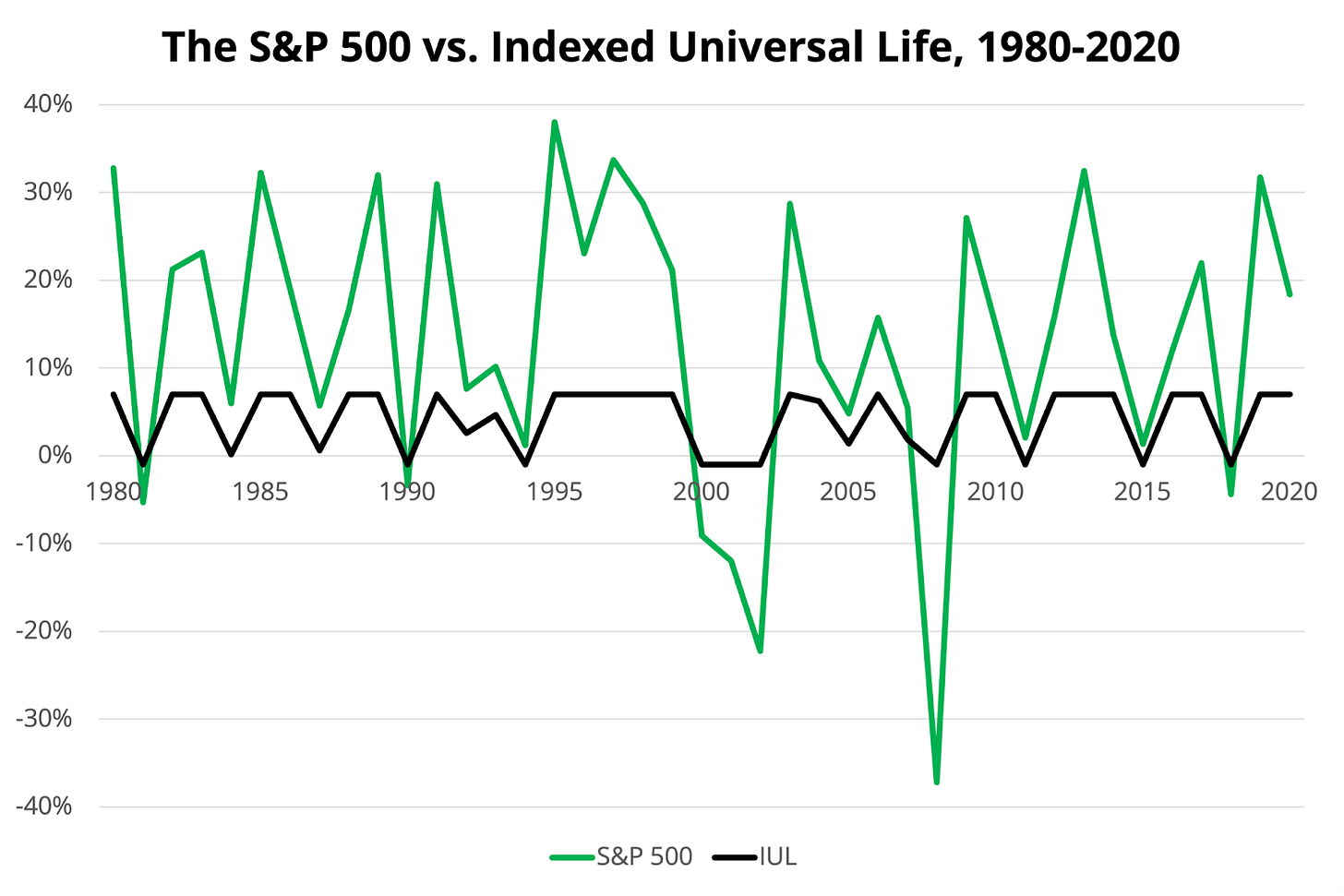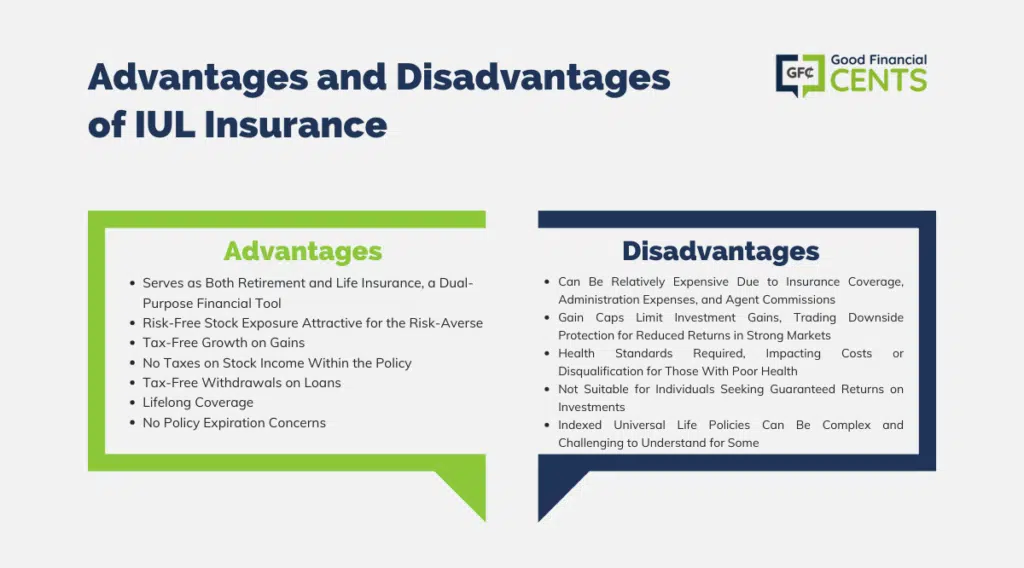All Categories
Featured
Table of Contents
1), often in an effort to beat their group averages. This is a straw male debate, and one IUL individuals like to make. Do they contrast the IUL to something like the Lead Total Securities Market Fund Admiral Show to no tons, an expenditure ratio (ER) of 5 basis factors, a turnover proportion of 4.3%, and an outstanding tax-efficient document of circulations? No, they compare it to some terrible proactively taken care of fund with an 8% tons, a 2% ER, an 80% turnover ratio, and a dreadful record of temporary capital gain distributions.
Shared funds commonly make annual taxable distributions to fund proprietors, even when the worth of their fund has decreased in value. Common funds not just call for income reporting (and the resulting yearly taxation) when the shared fund is rising in worth, but can also impose earnings tax obligations in a year when the fund has gone down in worth.
That's not just how common funds work. You can tax-manage the fund, harvesting losses and gains in order to decrease taxed circulations to the capitalists, however that isn't somehow mosting likely to transform the reported return of the fund. Only Bernie Madoff kinds can do that. IULs prevent myriad tax traps. The possession of shared funds might call for the common fund owner to pay projected tax obligations.

IULs are very easy to place to make sure that, at the owner's fatality, the recipient is exempt to either revenue or inheritance tax. The exact same tax reduction techniques do not function nearly too with shared funds. There are numerous, commonly expensive, tax obligation catches linked with the moment acquiring and selling of shared fund shares, traps that do not relate to indexed life insurance policy.
Chances aren't really high that you're mosting likely to go through the AMT because of your common fund circulations if you aren't without them. The remainder of this one is half-truths at best. For instance, while it holds true that there is no income tax obligation because of your successors when they acquire the proceeds of your IUL policy, it is also real that there is no income tax obligation as a result of your heirs when they inherit a shared fund in a taxable account from you.
Universal Life Insurance For Seniors
There are far better means to avoid estate tax issues than acquiring investments with low returns. Common funds might create income taxes of Social Security advantages.

The growth within the IUL is tax-deferred and may be taken as free of tax income using loans. The plan owner (vs. the shared fund manager) is in control of his/her reportable earnings, therefore enabling them to decrease or perhaps get rid of the tax of their Social Security advantages. This is excellent.
Here's an additional minimal issue. It holds true if you acquire a mutual fund for say $10 per share prior to the distribution date, and it distributes a $0.50 circulation, you are after that going to owe tax obligations (possibly 7-10 cents per share) regardless of the reality that you haven't yet had any kind of gains.
But in the long run, it's actually concerning the after-tax return, not just how much you pay in tax obligations. You are going to pay even more in taxes by utilizing a taxable account than if you purchase life insurance policy. You're likewise probably going to have more cash after paying those taxes. The record-keeping requirements for owning mutual funds are considerably a lot more intricate.
With an IUL, one's records are kept by the insurer, copies of annual statements are sent by mail to the proprietor, and distributions (if any type of) are amounted to and reported at year end. This set is likewise type of silly. Naturally you need to keep your tax documents in case of an audit.
Equity Index Universal Life Insurance
All you have to do is shove the paper into your tax folder when it turns up in the mail. Rarely a factor to buy life insurance policy. It's like this guy has never bought a taxed account or something. Mutual funds are commonly component of a decedent's probated estate.
Furthermore, they are subject to the delays and expenditures of probate. The profits of the IUL policy, on the other hand, is always a non-probate circulation that passes outside of probate directly to one's named beneficiaries, and is therefore exempt to one's posthumous creditors, unwanted public disclosure, or similar delays and prices.
Medicaid incompetency and life time earnings. An IUL can offer their proprietors with a stream of earnings for their entire lifetime, regardless of just how lengthy they live.

This is helpful when arranging one's events, and transforming assets to revenue before an assisted living home confinement. Shared funds can not be transformed in a similar manner, and are nearly constantly considered countable Medicaid assets. This is one more foolish one promoting that inadequate individuals (you recognize, the ones who require Medicaid, a government program for the bad, to spend for their assisted living facility) need to make use of IUL rather of shared funds.
The Cash Value In An Indexed Life Insurance Policy
And life insurance looks awful when contrasted fairly versus a retirement account. Second, people that have cash to acquire IUL above and beyond their pension are going to need to be horrible at managing cash in order to ever qualify for Medicaid to spend for their assisted living home prices.
Persistent and incurable illness rider. All plans will permit an owner's simple accessibility to money from their policy, often waiving any kind of surrender penalties when such people experience a severe ailment, need at-home care, or become confined to an assisted living facility. Common funds do not provide a similar waiver when contingent deferred sales charges still put on a common fund account whose owner needs to offer some shares to money the costs of such a keep.
How To Sell Universal Life Insurance
You get to pay even more for that advantage (cyclist) with an insurance policy. Indexed global life insurance provides fatality benefits to the recipients of the IUL owners, and neither the proprietor neither the recipient can ever before shed cash due to a down market.
I absolutely don't require one after I reach economic freedom. Do I want one? On average, a buyer of life insurance coverage pays for the real price of the life insurance policy advantage, plus the costs of the plan, plus the revenues of the insurance policy business.
Whole Life Versus Universal Life
I'm not completely sure why Mr. Morais included the whole "you can not shed money" once again below as it was covered quite well in # 1. He just desired to duplicate the best marketing factor for these things I suppose. Again, you do not shed small dollars, however you can shed genuine bucks, along with face major opportunity cost because of reduced returns.

An indexed global life insurance coverage plan owner might exchange their policy for a totally various policy without activating revenue taxes. A shared fund owner can stagnate funds from one shared fund firm to another without marketing his shares at the former (hence setting off a taxable event), and repurchasing new shares at the last, frequently based on sales charges at both.
While it is real that you can exchange one insurance coverage plan for one more, the reason that individuals do this is that the first one is such a terrible plan that even after purchasing a new one and experiencing the early, negative return years, you'll still come out ahead. If they were marketed the appropriate policy the very first time, they shouldn't have any type of need to ever before exchange it and experience the early, adverse return years again.
Latest Posts
Accumulation Value In Life Insurance
Iul Insurance Policy
Indexed Universal Life Insurance Calculator